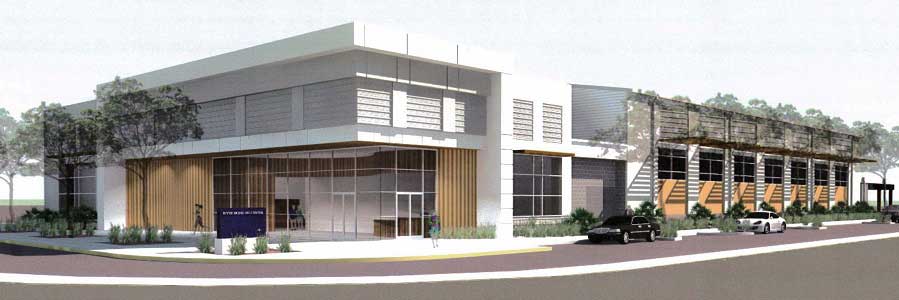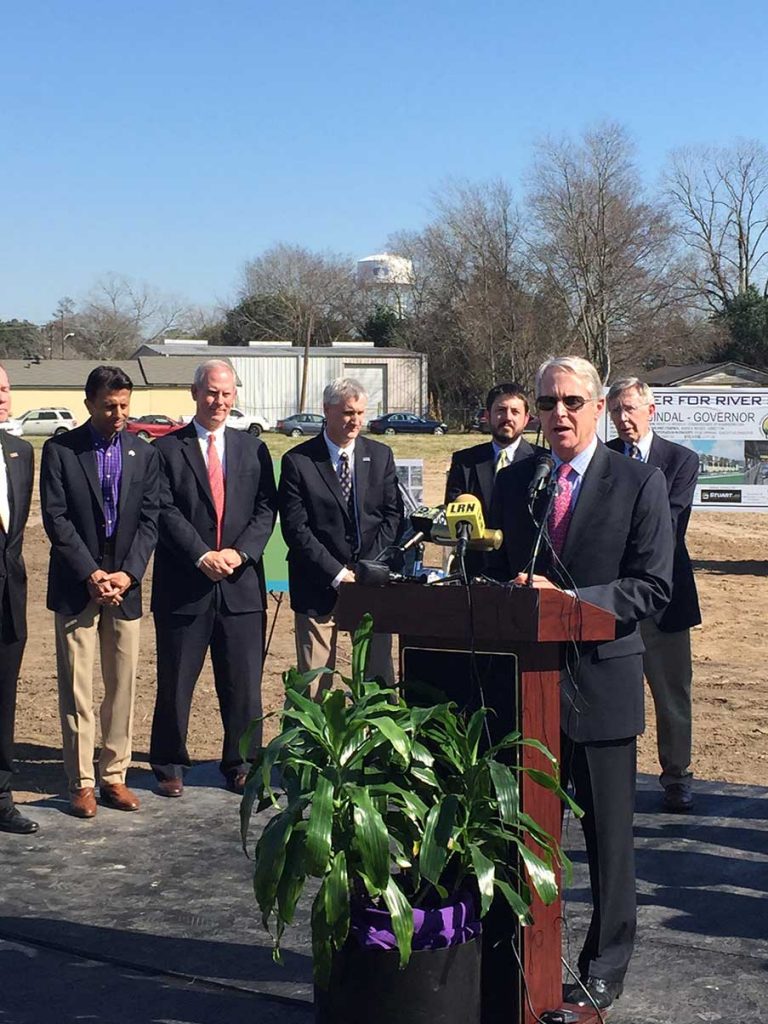Center for River Studies to Provide Venue for Multi-Discipline Collaboration and Coastal Research
BATON ROUGE — Today, Governor Bobby Jindal, officials from the Coastal Protection and Restoration Authority (CPRA), the Baton Rouge Area Foundation, LSU, the City of Baton Rouge, and the Water Institute participated in a groundbreaking ceremony for the Center for River Studies. The Center is the first building to begin construction on The Water Campus, a soon to be world-class research and engineering center in Baton Rouge that will serve as a hub for public, private, non-profit, and academic collaboration to develop innovative solutions for challenges facing coastal communities.
Governor Jindal said, “Today we’re taking another step forward in making The Water Campus a reality. This project is a concept we joined together to announce just over a year ago. The creation of the Center for River Studies embodies the principles on which The Water Campus was founded, which are to equip our best and brightest with the skills they need to help us further our work to protect and restore our coast. This facility provides a venue for researchers, scientists, engineers, and citizens to work together to advance solutions to challenges facing coastal Louisiana. The work conducted at this Center will generate scientific strategies that will protect our coastal communities and help us preserve coastal Louisiana for our children and generations to come.”
The Center for River Studies will house the Expanded Small Scale Physical Model, one of the largest moving bed physical models in the world. Measuring 90 feet by 120 feet, this state-of-the-art model is based on exact parameters of the river’s physical and kinetic properties, producing a degree of accuracy never before achieved in lower-river physical modeling. Designed to simulate the Mississippi River’s depth, sediment, and flow, the physical model will be used in conjunction with computer modeling to make informed decisions about the best way to sustain coastal Louisiana.

The Center will also include an interactive exhibit center focused on the achievements and advancements of the coastal program. In addition to showcasing actual projects, the center will highlight the robust science, tools, and community of knowledge and experience supporting the continued growth and development of Louisiana’s coastal program.
Kyle Graham, executive director of the CPRA said, “The sustainability of our coast depends upon the efficient utilization of our natural resources. Over the past 5 years we have spent more than $350 million actively mining material from the Mississippi River to construct wetlands and barrier islands. Expanding our knowledge on how to effectively and efficiently utilize the resources of the Mississippi River is critical to our success. The Center for River Studies will be a state of the art facility through which we can expand our knowledge of the river system, explore project concepts and educate stakeholders.”
“We are pleased to partner with the Coastal Protection and Restoration Authority on this important facility, which serves as a training ground for the next generation of coastal scientists and engineers,” said LSU President F. King Alexander. “As Louisiana’s flagship university, we continue to look for ways that academics and the public and private sectors can come together on projects that better our state, and helping to solve coastal erosion issues for South Louisiana is one of the most important research endeavors in which our faculty and students can be involved.”
The state CPRA led the planning and design effort and is funding construction of the model and facility with $16 million of Coastal Impact Assistance Program funds. Upon completion, the facility will be donated to LSU which will operate the model with funding from CPRA. The Baton Rouge Area Foundation and its real estate entity, Commercial Properties Realty Trust, are the developers of The Water Campus, which will eventually include a multitude of buildings and research facilities working in the fields of coastal restoration and protection and other water-related issues.

Mayor-President Kip Holden said, “As Mayor of a Mississippi River city, I have been actively working with groups like the U.S. Conference of Mayors, National League of Cities, Mississippi River Cities and Towns Initiative and the America’s Wetland Foundation to assure our river is healthy and sustainable for generations to come. The work produced by LSU at this new center will not only help save our coast and secure Louisiana’s economic future, it will position Baton Rouge as a world leader in coastal and river science and research.”
The Center for River Studies is the first facility to break ground on The Water Campus, a $45 million 33-acre development funded through a partnership between the State of Louisiana, the City of Baton Rouge, and the Baton Rouge Area Foundation.
BRAF President John Davies said, “The river model signals the beginning of a gathering place that will enable scientists to think about and solve the most difficult questions facing policymakers in deltas around the world. And for Baton Rouge, we expect this space to spark redevelopment up and down Nicholson Drive.”
The initial phase of The Water Campus’ development will include three additional facilities: an office building to house CPRA, a multi-tenant office building, and a new education and research center on the old Baton Rouge Municipal dock that will serve as the home of The Water Institute of the Gulf.
“This is an exciting step in the development of the Water Campus,” said Chip Groat, Ph.D., president and CEO of The Water Institute of the Gulf. “We look forward to the day that we will be able to actively collaborate with researchers from universities across the state as well as nationally and internationally known researchers who will want to be a part of the exciting work taking place on the campus.”
Developing over the next decade, the campus will expand to foster an integrated community focused on researching, engineering, and implementing solutions that will help secure the future of coastal Louisiana. The campus will provide an opportunity for multiple disciplines to unify their efforts and develop coastal knowledge and expertise that can be exported to other coastal communities around the world.

